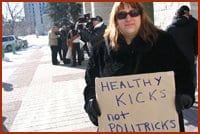Ottawa police will send letters to the owners of cars found cruising in known sex-work hotspots, they announced Oct 2. The AIDS Committee Of Ottawa (ACO) calls the decision “dangerous and discriminatory.”
The letters will push “sex trade workers further underground,” which “creates systemic barriers in providing support to women working in the trade, their children, access to health care and community social services,” according to an ACO release Oct 3.
That’s because police will be sending the inflammatory letter to friends, acquaintances and clients, says ACO’s Michelle Ball.
“If they’re pulled up and they’re talking to someone who’s in the sex trade, you don’t know if that’s her brother giving her a sandwich, an outreach worker trying to provide resources,” she says.
Opposition from health groups like ACO follows already vocal complaints from civil libertarians. The BC Civil Liberties Association says that sending letters like these to cars found in seedier neighborhoods is intrusive and doesn’t work. The policy also shames people who have never been convicted of a crime. The BCCLA campaigned against a similar practice by Vancouver police, a battle that they eventually won.
The scenario is reminiscent of Canada in the 1970s, when homophobes would collect the license plate numbers of cars parked outside gay bars and follow up with the owner of the car — or out them in the media. The RCMP used a similar tactic to scare gays and lesbians out of the public service, the military and their own ranks.
But that’s not the only problem ACO’s Ball has with the program. In particular, she takes issue with a portion of the letter which blames street prostitution for discarded needles, crack use — and the spread of HIV.
The letter to be sent to the registered owner of cars spotted cruising reads in part:
“There is a clear correlation between street prostitution and drug use, including crack cocaine, as well as a variety of health concerns including HIV and hepatitis. Community members including their children are frequently finding used needles and condoms in playgrounds and public areas. The increased pedestrian and vehicle traffic has a direct effect on the quality of life for the community and we need your help to improve this community,” say police in the letter, made public Oct 2. The first Ottawans to receive the letter could get it as early as next week.
It’s not sex work that puts you at high risk of contracting HIV and hepatitis, Ball says, it’s unsafe sex.
“The ill-informed message being sent is that women are vectors of HIV transmission and only works to further discriminate and isolate women. Canada’s own Public Health Agency indicates that people who experience marginalization and stigmatization experience higher risks of illness and disease,” writes Ball.
And the letter not only fails to address stigma, it increases it, she says.
“If HIV transmission were really the concern, why aren’t we getting people the resources they need to practice safe sex?” she says. “And they’re making the association that all people that are in the sex trade are in it to by crack cocaine. Many of these women are supporting a family — they’re doing it because it’s income.”
The police say they’re responding to community complaints, a now oft-repeated message coming from the OPS headquarters.


 Why you can trust Xtra
Why you can trust Xtra


